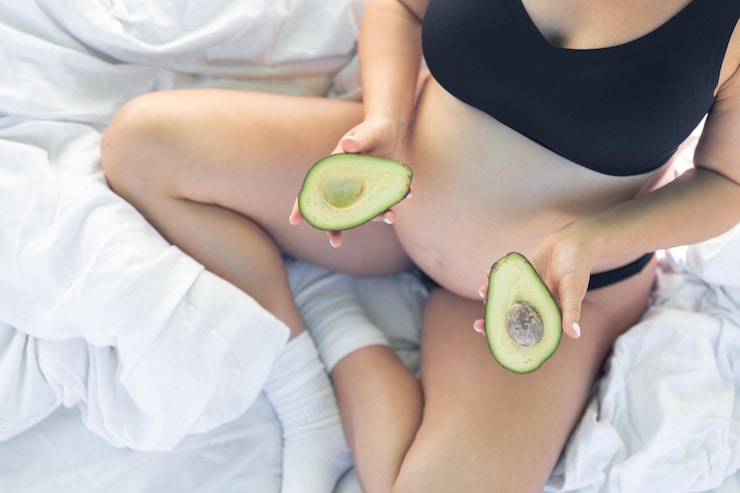Pregnancy is a natural state, not an illness, so you usually don’t need a very strict diet or special meal plans unless you develop complications like gestational diabetes or anemia.
Keep track of your pregnancy with a pregnancy tracker and follow basic healthy-eating rules: choose fresh foods, eat more often in smaller portions, and chew your food well.

For balanced nutrition during pregnancy aim for about 40–50% of calories from carbohydrates, 20–25% from protein, and 25–35% from fat, since fat needs increase during pregnancy.
Not all foods are safe while pregnant, so it’s important to know which ones to choose. Below are safer, nutritious options.
Safe carbohydrate-rich foods
Good carbohydrate choices include porridges, bread and baked goods, pasta, fruits and berries, and starchy vegetables like potatoes, carrots, and beets.
Whole grains are a key part of the diet. Eat fruits and vegetables that are high in beta-carotene (carrots, peppers, yellow fruits), vitamin C (citrus, parsley, red currants), and B2 (buckwheat, leafy greens).
Eat fruit and berries in moderation; for example, eating a lot of grapes may cause allergic reactions or raise body temperature in some people.
Avoid pineapple and unripe papaya. Pineapple contains an enzyme that has been linked to miscarriage or early labor, and unripe papaya has substances that can trigger uterine contractions.
Wash your hands often and rinse fruits and vegetables well under running water to reduce the risk of infection.
Safe protein-rich foods
Protein is essential for building fetal tissues and organs. As your baby grows faster in the second trimester, focus on getting enough protein.
Good sources are meat (especially poultry), fish, and dairy. Include eggs, nuts, and legumes to get a full range of amino acids.
Many protein foods also contain important micronutrients. Doctors recommend taking folic acid before pregnancy and during the first trimester; it’s found in liver, beans, and green peas. Dairy provides calcium and zinc, and nuts are a good source of magnesium.
Safe fat-rich foods
Pay attention to the types of fats you eat. Most fats should be unsaturated, but include some saturated fats too. Fatty fish—such as mackerel, salmon, trout, and sardines—are especially beneficial.
If you buy raw milk from a farmer’s market, boil it before using and avoid products made from unpasteurized milk during pregnancy.
Avoid large predatory fish that can have high mercury levels, like king mackerel, sharks, sailfish, swordfish, and bigeye tuna.
Main principles
Your energy needs rise during pregnancy. In the first trimester, overall needs don’t change much, but it’s important to eat foods rich in folic acid, iron, and omega-3s—like leafy greens, dairy, fish, and meat. In the second and third trimesters, you’ll need more energy, which can come from vegetables, grains, fruits, and dairy.
Protein is especially important for your tissues, your baby’s growth, and milk production. Eat meat, dairy, fish, legumes, cereals, eggs, nuts, and seeds. Vegetarians should focus on legumes, seeds, and nuts to meet protein needs.
Choose foods that are not roasted, smoked, or overly salty when possible. Cook eggs thoroughly to reduce the risk of salmonella.
Hydration
Aim for about 1.9 to 2.8 liters of water daily. Drink small amounts often, since your body may not absorb a large amount all at once.
Prefer drinking from glass containers rather than plastic to avoid exposure to phthalates, which could affect development. Also limit strong coffee and other high-caffeine drinks like strong green tea.
Takeaway
Pregnancy is a vital time to focus on nutrition. Eating safe foods and getting the right mix of macronutrients and micronutrients supports both the mother’s health and the baby’s development throughout the nine months.
References:
https://www.ucsfhealth.org/education/eating-right-before-and-during-pregnancy
https://www.healthline.com/health/papaya-in-pregnancy#latex-in-unripe-papaya
https://health.gov/myhealthfinder/pregnancy/nutrition-and-physical-activity/eat-healthy-during-pregnancy-quick-tips